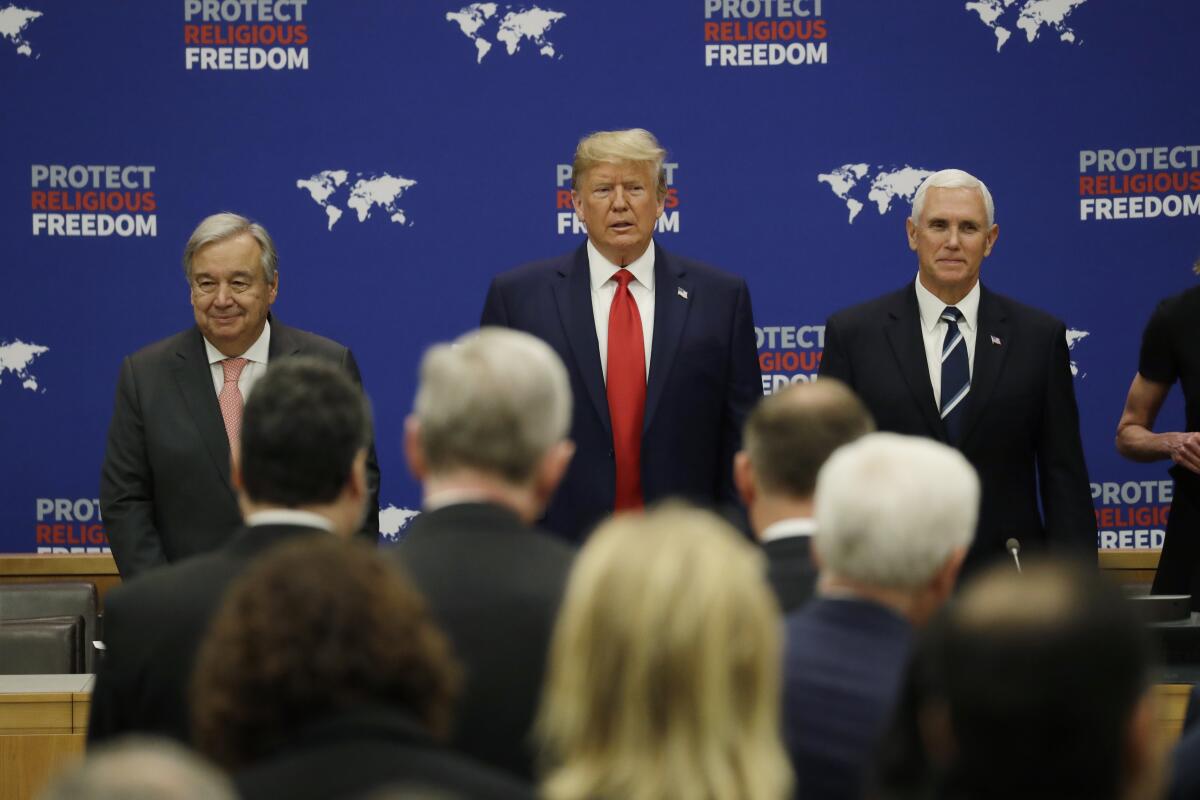Trump skips most of U.N. climate summit for speech on religious freedom

UNITED NATIONS — President Trump skipped the bulk of the U.N. summit on climate change Monday to deliver remarks on religious freedom, pushing an issue that’s crucial to his evangelical supporters in the 2020 election, while downplaying the chief concerns of fellow world leaders.
Trump made an unexpected 15-minute stop at the climate summit, and listened to speeches from Indian Prime Minister Narendra Modi and German Chancellor Angela Merkel.
But Trump, who has withdrawn from the 2015 Paris agreement on mitigating the effects of climate change, did not address the gathering, which drew about 60 world leaders in the one-day meeting organized by U.N. Secretary-General Antonio Guterres.
Trump instead moved to a smaller event titled “Global Call to Protect Religious Freedom,” where he urged other nations to prevent religious persecution.
“We ask the governments of the world to honor the eternal right of every person to follow their conscience, live by their faith and give glory to God,” Trump said. He denounced the attacks on synagogues in Pittsburgh and San Diego County, as well as the murder of Muslims at mosques in New Zealand.
The president’s commitment to religious freedom has been patchy. While running for president, he proposed “a total and complete shutdown of Muslims entering the United States.”
After taking office, he fought to prevent visitors and immigrants from several countries with mostly Muslim populations. The third version of his executive order, which also included North Korea, was upheld by the Supreme Court last year.
Trump has also shied away from directly confronting China on its treatment of Uighurs, a predominately Muslim ethnic minority, as he tries to secure a trade deal in negotiations with Beijing.
A U.N. human rights panel estimated that China has interned 1 million Uighurs in a region that has become a “massive internment camp that is shrouded in secrecy.”
Beijing has justified its actions as a security measure, but Secretary of State Michael R. Pompeo dismissed that explanation on Sunday.
“I want to make clear that China’s repressive campaign in Xinjiang is not about terrorism,” he said. “It’s about China’s attempt to erase its own citizens’ Muslim faith and culture.”
Trump’s emphasis on religious freedom has helped him maintain support among evangelicals, a key voting bloc for his reelection campaign. His administration has supported abortion restrictions, pushed to roll back antidiscrimination protection for transgender people, and spotlighted high-profile cases of Christians being imprisoned overseas.
Franklin Graham, an evangelical leader; Robert Jeffress, a conservative Baptist church leader; and Tony Perkins, head of the Family Research Council, were in the audience for Trump’s speech. So was Andrew Brunson, a Christian missionary who was detained for two years in Turkey until the White House helped negotiate his release last October.
More to Read
Get the L.A. Times Politics newsletter
Deeply reported insights into legislation, politics and policy from Sacramento, Washington and beyond. In your inbox three times per week.
You may occasionally receive promotional content from the Los Angeles Times.











